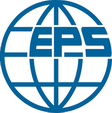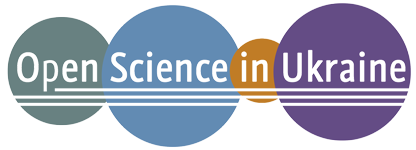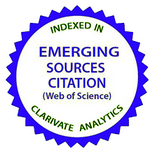Rapid formation methods of arrays of randomly distributed Au and Ag nanoparticles, their morphologies and optical characteristics
DOI:
https://doi.org/10.15330/pcss.22.4.804-810Keywords:
nanoparticles, arrays of randomly distributed, transmission spectra, surface plasmon resonanceAbstract
By the method of rapid radiation heating (at a speed of 20-25 K/s) of Au and Ag films with a thickness of 4-35 nm to temperatures of 573-693 K in air and in the process of vacuum deposition of silver on heated (up to 700 K at a heating rate of 10 K/s ) glass substrates formed Au and Ag NPs arrays with nanoparticle sizes from several tens to hundreds of nanometers, the position λSPR of which is in the range of 520-597 nm for Au NPs and 424-509 nm for Ag NPs. It is established that the average size of nanoparticles depends on the thickness of gold and silver films and the annealing temperature. The results testify that glass substrates with arrays of randomly distributed gold NPs can be used as effective SERS-substrates for the investigation of Raman spectra of nanosized (50-100 nm) chalcogenide films.
References
R.K. Chang, Т.Е. Furtak, (1982), Surface enhanced Raman scattering, New York: Plenum Press, pp. 379
М. Moskovits, Surface-enhanced spectroscopy, Rev. Modern Phys. 57(3), 783-826 (1985); https://doi.org/10.1103/RevModPhys.57.783.
I.P. Nabiev, R.G. Efremov, G.D. Chumanov, Giant Raman scattering and its application to the study of biological molecules, Phys. 154(3), 459-496 (1988).
D.M. Kuncicky, S.D. Christesen, O.D. Velev, Role of the micro- and nanostructure in the performance of surface-enhanced Raman scattering suhstrates assembled from gold nanoparticles, Applied Spectroscopy, 59(4), 401-409 (2005); https://doi.org/10.1366%2F0003702053641559.
M.L. Trunov, P.M. Lytvyn, P.M. Nagy, et al. Light-induced mass transport in amorphous chalcogenides/gold nanoparticles composites, Semiconductor Physics, Quantum Electronics & Optoelectronics, 16(4), 354-361 (2013).
M.L. Trunov, P.M. Lytvyn, P.M. Nagy, et al., Light-induced mass transport in amorphous chalcogenides: Toward surface plasmon-assisted nanolithography and near-field nano imaging, Phys. Status Solidi B., 251(7), 1354-1362 (2014); https://doi.org/10.1002/pssb.201350296.
M.L Trunov, P.M. Lytvyn, V.A. Sterligov, et al., Formation of Nanostructures Upon Photoexcitation of Surface Plasmon Resonance in Nanocomposites Derived from Textured Gold Films and Chalcogenide Glass», Theoretical and Experimental Chemistry, 54(2), 107–113 (2018); https://doi.org/10.1007/s11237-018-9553-y.
V.O. Yukhymchuk, O.M. Hreshchuk, V.M. Dzhagan, et al., Experimental studies and modeling of “starlike” plasmonic nanostructures for SERS application, Phys. Stat. Solidi B., 1800280 (1-8) (2018); https://doi.org/10.1002/pssb.201800280.
A.V. Korotun, A.O. Koval’, A.A. Kryuchyn, V.M. Rubish, V.V. Petrov, I.M. Titov, Nanophoton technologies. Modern state and prospects, Uzhgorod: PE Sabov A.M, 482 p. (2019).
I. Csarnovics, M. Veres, P. Nemec, et al., Surface plasmon enhanced light-induced changes in Ge-Se amorphous chalcogenide-Gold nanostructures, J. Non-Cryst.Solids: X, 6, 100045 (2020); https://doi.org/10.1016/j.jnoncrysol.2020.120491.
V.M. Rubish, M.O. Durkot, O.M. Hreshchuk, et al., Investigation of the short-range order structure of nanosized chalcogenide films by SERS-method, Mat. Intern. Meeting “Clusters and nanostructured materials (CNM-6)”, Uzhgorod, Ukraine, pp.134-135 (2020).
Т.І. Yasinko, V.O. Yukhymchuk, V.M. Rubish, et al., Raman spectroscopy study of nano-sized amorphous layers of selenium and plasmon structures “Au NPs/ Se film”, Mat. Intern. Meeting “Clusters and nanostructured materials (CNM-6)”, Uzhgorod, Ukraine, pp.326-327 (2020).
V.M. Rubish, O.M. Greshchuk, М.О. Durkot, [et. al.], Structural studies of photosensitive composites “NPs Au/selenium film”, Data recording, storage & processing, 22(4), 12-18 (2020).
M.O. Durkot, V.K. Kyrylenko, A.A. Tarnaj et al. Surface morphology and optical characteristics of arrays of randomly distributed gold nanoparticles Mat. Intern. Meeting “Clusters and nanostructured materials (CNM-6)”, Uzhgorod, Ukraine, pp.209-210 (2020).
L.I. Makar, S. Mudry, V.M. Rubish, et al., ESEM study of surface morphology of arrays of noble metals nanoparticles, Mat. Intern. Meeting “Clusters and nanostructured materials (CNM-6)”, Uzhgorod, Ukraine, pp.114-115 (2020).
M.O. Durkot, V.K. Kyrylenko, P.M. Lytvyn, Formation of arrays of silver nanoparticles of different morphology and their optical characteristics, Abstr. VIII Ukrainian Scientific Conference on Physics of Semiconductors (USCPS-8), Uzhhorod, Ukraine, V.1, pp. 194-195 (2018).
M.O. Durkot, V.K. Kyrylenko, P.M. Lytvyn et al., Formation of Ag nanoparticles arrays and their optical transmittance spectra, Mat. Intern. Meeting “Clusters and nanostructured materials (CNM-5)”, Uzhgorod, Ukraine, pp. 163-164. (2018).
V.V. Petrov, A.A. Kryuchin, V.M. Rubish, , Materials perspective optoelectronic devices, Kiev: Naukova dumka, 335 p. (2012).









